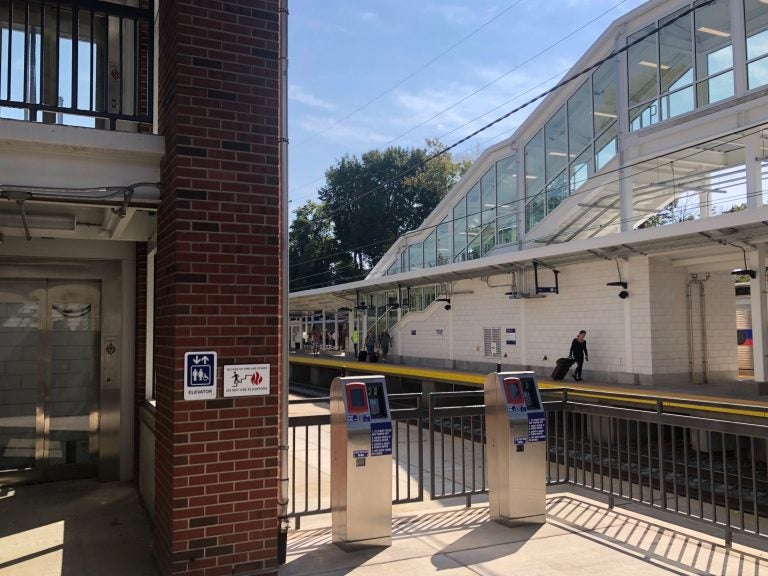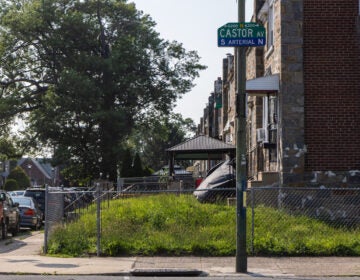Accessible for all is the mantra of Paoli rail station after $48M remake
SEPTA, Amtrak, PennDOT, and the Federal Transit Administration joined forces to complete a $48 million initiative to put Paoli station in compliance with ADA regulations.

Paoli's upgraded station. (Darryl C. Murphy/WHYY)
One of SEPTA’s busiest Regional Rail stations just got an upgrade. The authority, Amtrak, PennDOT, and the Federal Transit Administration joined forces to complete a $48 million initiative to make Paoli station accessible to all riders.
Passengers can experience a new high-level center platform, new elevators, stairs and ramps, a pedestrian overpass, and parking lot improvements. The rehab also brought improvements to the existing building and upgrades in rail infrastructure designed to make the station compliant with the Americans with Disabilities Act.
The project started out of legal necessity after advocates with the group Disability Rights Pennsylvania sued Amtrak in 2012. charging that the station’s inaccessibility violated the ADA.
At the time, there was no wheelchair lift, making it impossible for passengers who depend on wheelchairs to ride.
“The Paoli station was what Amtrak called a blocked station,” Kenneth Shiotani, a senior staff attorney at the Disability Rights Network, told the Philadelphia Inquirer. “They wouldn’t sell anybody a ticket if you said you were someone with a mobility impairment.”
According to the Inquirer, the station was one of many Amtrak stations that didn’t comply with ADA regulations.
Amtrak agreed to bring the station to ADA compliance to settle the suit.
“Now that it is fully accessible, it is a station that I’ll be able to use for my work and travels as well,” said Rocco Iacullo, an attorney with Disability Rights Pennsylvania, which is an affiliate of Disability Rights Network. “So I’m also excited about that on a personal level.”
The Paoli revamp also included restoration of the station’s historic 19th-century wooden canopy. It will be repurposed as a cover for bike parking facilities.
Close to 1 million SEPTA and Amtrak riders passed through the station last year. It’s the busiest station on SEPTA’s busiest line, the Paoli-Thorndale line, according to the regional transit provider.
“This is a major station,” said SEPTA general manager Jeffrey Knueppel. ”So, it’s really fantastic to be able to make over the station and have it accessible.”
Knueppel said more improvements are coming to the area, including a transportation center with a parking garage, retail and new bus facilities.
The Paoli-Thorndale line is owned by Amtrak, so it took the lead on the project, said SEPTA spokesman Andrew Busch, but the authority is always looking to improve accessibility throughout its network.
“We’re trying to catch up with bringing older stations into line with ADA requirements,” said Busch. “We don’t stop until we have everything accessible … It’s something that we’re pressing ahead on very aggressively.”
Upgrades to Exton station are expected to be completed later this year.
SEPTA also is working to improve accessibility at other stations, many of which are not ADA-compliant, creating big problems for people with mobility challenges.
State Sen. Andy Dinniman, whose district covers Chester County, congratulated officials on the completion of the Paoli upgrade and the coming upgrade for Exton. However, he urged Amtrak to upgrade other stations in Chester County such as Downingtown, Coatesville, and Parkesburg, where construction has yet to begin.
“Disabled people are not just here in Paoli, are not just in Exton,” Dinniman said. “They’re not just in the wealthiest of our communities. They’re in the poor communities as well.”
WHYY is your source for fact-based, in-depth journalism and information. As a nonprofit organization, we rely on financial support from readers like you. Please give today.






